|
Autumn at Grazer Kunstverein
23 September – 17 November 2017
Opening Reception: Saturday 23 September, 6:30pm
Live performances of The Seed Eaters:
23, 24, 25, 26, 27 September, 7:30pm
New Commission:
Emily Mast
On Display:
Ruth E Lyons
Fiston Mwanza Mujila
Edward Clydesdale Thomson
Céline Condorelli
Chris Evans mit Morten Norbye Halvorsen
Fiona Hallinan
Isabella Kohlhuber
Isabel Nolan
Adam Zagajewski
On Reflection:
Ernst Fischer
This season Emily Mast transforms the Grazer Kunstverein with The Seed Eaters – an experimental play and exhibition co-produced with steirischer herbst.
Inspired by the awkward and sometimes dangerous space that separates strangers, The Seed Eaters plants connections between people, to engender collusion, teamwork and blind hope, in a social and political moment when it feels like the world might be falling apart. The work emboldens empathy, through the collective experience of endings – enacted by way of continuous new beginnings. As a meditation on conclusions, The Seed Eaters creates and holds a space where language, objects, instructions, and participants’ personalities have equal value, if only for a moment, before starting over.
The seasonal artistic programme of the Grazer Kunstverein is accumulative. This new production of The Seed Eaters is presented amidst traces of existing works by Ruth E Lyons (Women’s Wear for Worldly Work), Fiston Mwanza Mujila (Le Fleuve dans le Ventre / Der Fluß im Bauch), Edward Clydesdale Thomson (The Coming Garden), Céline Condorelli (Things That Go Without Saying), Chris Evans and Morten Norbye Halvorsen (Jingle), Fiona Hallinan (Fink’s), Isabella Kohlhuber (Space for an Agreement), Isabel Nolan (The Provisory Rug, adaptable for past, present and future. [For Marie Lieb]), and Adam Zagajewski (We Know What Art Is). The year-long programme is drawn together under the guiding leitmotif ‘The Necessity of Art’ inspired by author, politician, and dedicated anti-fascist Ernst Fischer.
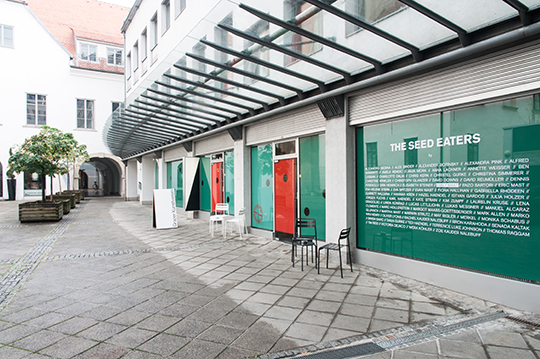
Exterior view, Emily Mast The Seed Eaters, new commission for Autumn 2017, Grazer Kunstverein. Photography by Christine Winkler.
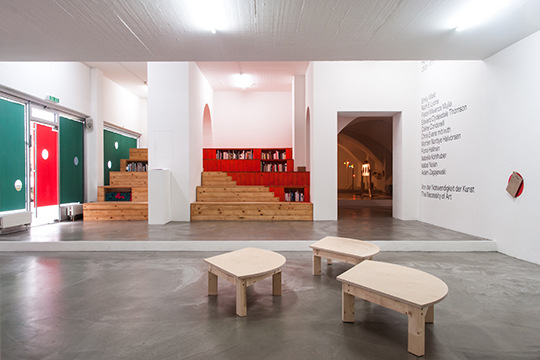
Emily Mast, The Seed Eaters, new commission for Autumn 2017, Céline Condorelli, Things That Go Without Saying, on display for Autumn 2017, Grazer Kunstverein. Photography by Christine Winkler.
Emily Mast
The Seed Eaters, 2017
Emily Mast, working with a cast of many, has created a new play especially for the Grazer Kunstverein, to be performed over a broader spatial and temporal framework than usually possible within the conventions of theatre making.
The experimental play unfolds as both a series of planned or impromptu performances, and as an exhibition in its own right. Abstractly, the work is about empathy – explored through a revolving navigation of endings. From the moment a moon vanishes in daylight, to an agonizing life or death decision, to an agave plant’s final days, to the last dance, to the last will and testament of the artist’s own father-in-law, The Seed Eaters explores the potential and capacity for ‘endings’ – as transformational moments – to enact real emotion between strangers, in the present tense.
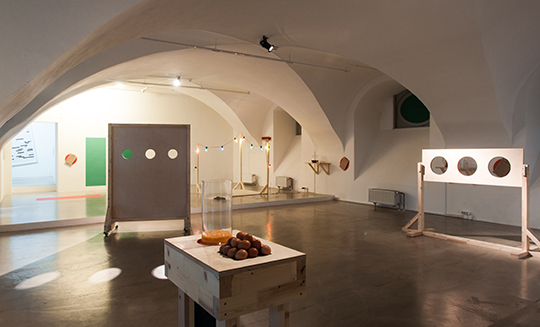
Emily Mast, installation view of The Seed Eaters, new commission for Autumn 2017, Grazer Kunstverein, Photography by Christine Winkler.
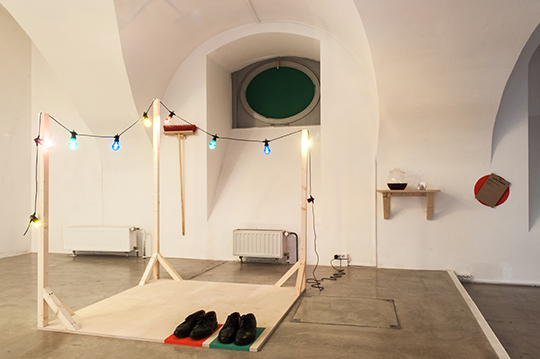
Emily Mast, #8 Slow Dance, The Seed Eaters, new commission for Autumn 2017, Grazer Kunstverein, Photography by Christine Winkler.
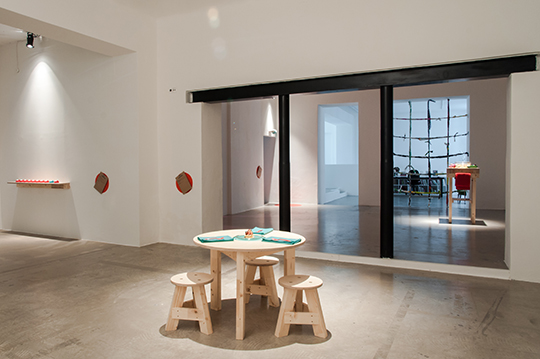
Emily Mast, #13 Last Bite, The Seed Eaters, new commission for Autumn 2017, Grazer Kunstverein, Photography by Christine Winkler.
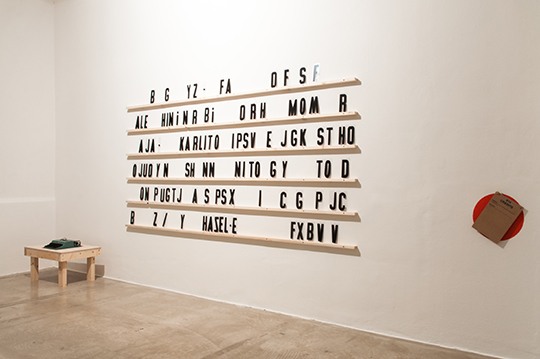
Emily Mast, #14 Credits, The Seed Eaters, new commission for Autumn 2017, Grazer Kunstverein, Photography by Christine Winkler.
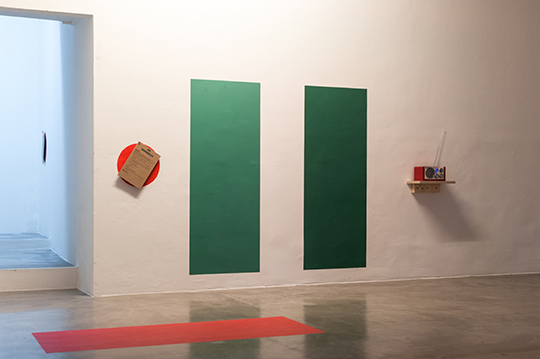
Emily Mast, #9 Swimsuit, The Seed Eaters, new commission for Autumn 2017, Grazer Kunstverein, Photography by Christine Winkler.
The script was developed in collaboration with playwright Rachel Kauder Nalebuff, the musical score was conceived in collaboration with percussionist Manuel Alcaraz Clemente (Schallfeld Ensemble), garments were designed with dancer and costumer Nikii Henry, and the menu was devised in collaboration with Fiona Hallinan (Fink’s). For the first five nights of the exhibition, live scheduled performances take place each evening, in both English and German. The fifteen opening cast members, all residents of Graz, have been chosen for how little they seem to have in common.
Following the live performances, and for the remaining duration of the exhibition, visitors to The Seed Eaters are invited to explore the exhibition at their own pace, and are encouraged to embody the roles of the absent players, thereby bringing to life a personalized version of the play. This can be done by going in or out of numerical order, reading the printed instructions aloud or to yourself, and executing the suggested actions as you see fit. Please feel free to use the props, but please replace them where you found them once finished. If you require assistance or would like to involve another player or two, please ask a member of our team.
Stations (or scenes) are titled and numbered thus;
#1 Lullaby
#2 Backstage
#3 Moon | Orgasm | Iceberg
#4 Bows
#5 Afterwards
#6 Procedure
#7 I Do
#8 Slow Dance
#9 Swimsuit
#10 Ted’s Will
#11 Check In
#12 A Cure
#13 Last Bite
#14 Credits
#15 Rant
#16 Bloom
#17 The Roll
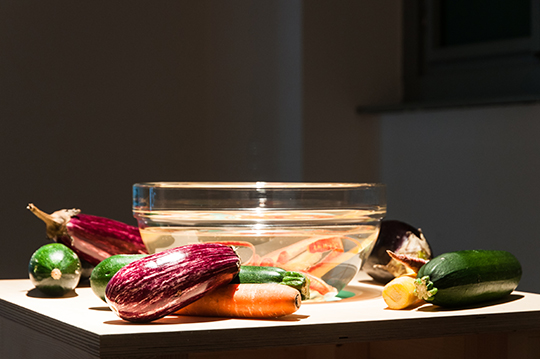 Emily Mast, #15 Bloom, The Seed Eaters, new commission for Autumn 2017, Grazer Kunstverein. Photography by Christine Winkler.
Emily Mast, #15 Bloom, The Seed Eaters, new commission for Autumn 2017, Grazer Kunstverein. Photography by Christine Winkler.
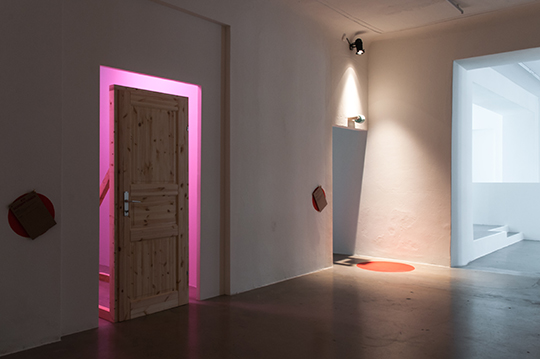
Emily Mast, #14 Rant and #17 The Roll, The Seed Eaters, new commission for Autumn 2017, Grazer Kunstverein. Photography by Christine Winkler.
The following people all contributed to the development and realisation of The Seed Eaters: Alejandro Medina, Alex Binder, Alexander Borinsky, Alexandra Pink, Alfred Annawitt, Amela Rendic, Anja Mörk, Anna Lackner, Annette Weisser, Ben Lasman, Charlotte Dalia, Chris Kern, Christel Gurke, Christina Simmerer, Christine Winkler, Christoph Glanzer, David Downs, David Reumüller, Dennis Ferescu, Dirk Heinrich, Elisabeth Steiner, Emily Mast, Enzo Sartori, Eric Mast, Eva Helene Stern, Eva Spitzer, Evan Mast, Fiona Hallinan, Gabriella Rhodeen, Garrett Hallman, Hannah Kren, Hazel Haendel, Istvan Gardos, Julia Holzer, Jürgen Fuchs, Karl Haendel, Kate Strain, Kim Zumpf, Laurelin Kruse, Lena Dragoljic, Linda Konrad, Lucas Littlejohn, Lukas Messner, Manuel Alcaraz Clemente, Margot Maass-Goettsberger, Mark Allen, Marko Gluhaich, Martha Mast, Marwin Strutz, May Rigler, Merkel, Monika Schabus, Nikii Henry, Oliver Lyons, Rachel Kauder Nalebuff, Rron Karahoda, Senada Kaltak, Sinisa Savić, Tanja Gurke, Ted Haendel, Terrence Luke Johnson, Thomas Raggam, Tim Reid, Victoria Dejaco, Wera Köhler, Zoe Kauder Nalebuff, Your Name Here.
Emily Mast was born in Akron, Ohio, in 1976. Her performances have been presented at venues including: The Irish Museum of Modern Art, Dublin (2017); the Power Plant Contemporary Art Gallery, Toronto (2016); La Ferme du Buisson, Noisiel (2015); China Art Objects Galleries, Los Angeles (2015); Mona Bismarck American Center, Paris (2015); Silencio, Paris (2015); the Los Angeles County Museum of Art (2014); The Hammer Museum, Los Angeles (2014); Night Gallery, Los Angeles (2014); Robert Rauschenberg Foundation Project Space, New York (2013); Public Fiction, Los Angeles (2012); REDCAT, Los Angeles (2012); MUHKA, Antwerp (2011); Human Resources, Los Angeles (2010) and Performa, New York (2009).
The Seed Eaters is a co-production with steirischer herbst 2017.
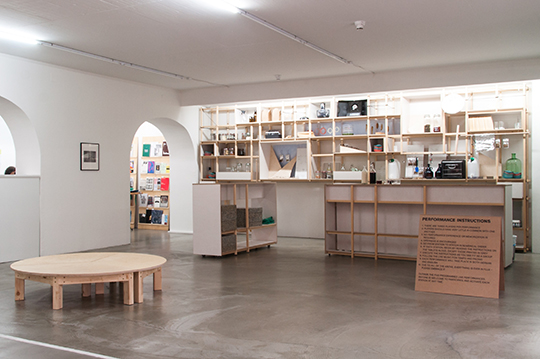
Fiona Hallinan, Fink’s ongoing commission for Autumn 2017, Grazer Kunstverein, Photography by Christine Winkler.
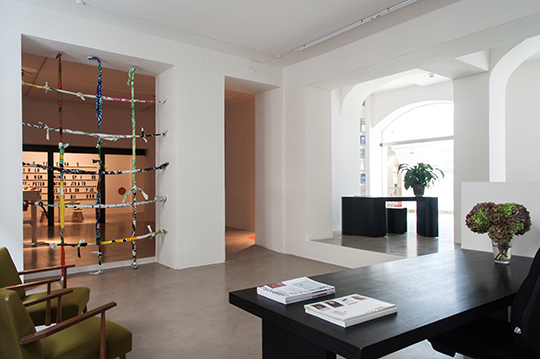
Edward Clydesdale Thomson, Reluctant Soft Furnishings and Isabella Kohlhuber, untitled (table) as part of Space for an Agreement, on display for Autumn 2017, Grazer Kunstverein, Photography by Christine Winkler.
Ernst Fischer
The Necessity of Art – A Marxist Approach, 1959
Ernst Fischer was born in Bohemian Komotau in 1899. He died in 1972 at the house of the three Feuerlöscher sisters, now known as Prenning’s Garten in Deutschfeistritz, just outside of Graz. During his early life Fischer studied philosophy in Graz, before joining the staff of the Arbeiter-Zeitung, where he remained until 1934. Thereafter he became a member of the Communist Party, and in 1945 he was instrumental in establishing a provincial government in Austria, where he briefly played the role of Minister of Education. Fischer was also founder and editor-in-chief of Neues Österreich. From the late 1950’s onwards he engaged himself more deeply in the literary world, producing books and plays reflecting on the importance of culture for the class struggle, his earlier experiences as an exile and freedom fighter, and the necessity of art.
In 1959 Fischer first published his book The Necessity of Art. In it, he explored why art matters despite the trauma and hardship of everyday life. Fischer was a virulent opponent of fascism and the Nazis, fighting first through socialism, then through communism, and finally retreating into arts and culture as a space of reimagining and resistance. As the spirit guide throughout 2017, Fischer’s writings, thoughts and influence find fresh resonance by motivating the artistic programme and inspiring new commissions and artworks. Throughout the second half of 2017 Grazer Kunstverein’s first Researcher in Residence Anousheh Kehar will develop a text exploring Fischer’s retreat into culture as he withdrew from political life. This follows a conference as part of the Summer Programme, wherein speakers including Marina Fischer-Kowalski, Eugen Gross, Ludwig Hartinger and Karl Wimmler demonstrated aspects of the significant legacy Fischer continues to inspire today.
|
![]()












